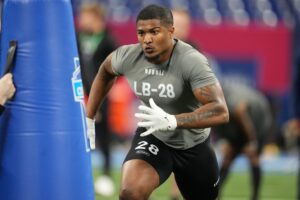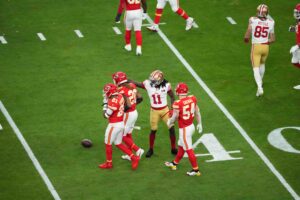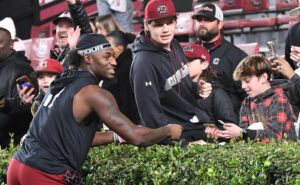As the name suggests, Wild-Card Weekend is often one of the most exciting weekends in all of sports. Typically full of upsets, shootouts, and the first chapter of what becomes a Cinderella story of a Super Bowl run, this first stage of the NFL playoffs often sets the tone for the remainder of the postseason. For the Denver Broncos, Wild-Card Weekend has mostly been unenjoyable throughout their time in the league. Despite only winning a quarter of their appearances in games on this weekend, Denver boasts one truly memorable game. On January 8th, 2012, the Broncos hosted the Pittsburgh Steelers in what would soon be remembered as the best Wildcard game in Denver Broncos history.
The Best Denver Broncos Wild-Card Game
In the 61 years since the franchise’s birth, the Broncos have competed in eight Wild-Card games. Five of these games came after the turn of the century. Unfortunately for Broncos Country, the boys in orange and blue have only earned a win in two of these games. Worse, they were outscored 237 to 146. The 2011-2012 Steelers ranked first in points and yardage allowed on defense and had not yet allowed a 300-yard passer that season. Playing opposite them? A Broncos team riding a three-game losing streak. The Broncos won the AFC West with a paltry 8-8 record, backing into the playoffs to host the 12-4 Steelers.
Setting the Stage
At halftime on October 9th, 2011, head coach John Fox made the decision to bench Kyle Orton down 23-10 to the then-San Diego Chargers. In relief came 2010 first-round draft pick, Tim Tebow, providing a catalyst for the entire team, defense included. Said defense held the Chargers to two field goals in the second half. The offense, on the other hand, scored two touchdowns and ended the game with a desperation throw hitting the turf near the goal line, attempting to finish a comeback bid.
Tebow became the permanent starter at quarterback after lighting a fire under his team against San Diego. Inheriting a 1-4 record from Orton, Tebow went on to lead the Broncos to a 7-4 record in the final 11 games. They often won by suddenly playing with greater urgency at the end of games. In fact, six of Tebow’s seven wins were by a single possession, with a 14-point win over the then Oakland Raiders as the lone exception. Even in light of Tebow’s problematic mechanics and perceived overdependence on his running capabilities, this was a magical time for Broncos Country.
Tebow Time
Outside of his performance against the Minnesota Vikings, Tebow had not yet had a standout passing performance. He accrued a mere 1,729 passing yards and 12 passing scores while completing less than half of his passes and throwing six interceptions. Admittedly, he did add 660 yards and six touchdowns on the ground. This gave him an average of 217.45 all-purpose yards per game (if including the game against San Diego).
A Sickle Cell trait in Ryan Clark, unfortunately, prevented the safety from playing with the rest of the Steelers defense. This helped contribute to Tim Tebow’s offensive explosion to the tune of 236 passing yards. Adding 50 rushing yards in regulation, he accumulating nearly 70 yards more than his average in the regular season. Second-year wide receiver Demaryius Thomas had, in regulation, accrued nearly a quarter of the yards he had totaled in the regular season, a similar breakout to his game against Minnesota.
End of Regulation
A Willis McGahee fumble halfway through the fourth quarter allowed the Steelers to complete a comeback from their 20-6 halftime deficit, tying the game at 23. A fourth-down sack of Ben Roethlisberger by Robert Ayers, Jr. brought the Broncos to overtime, where they managed to win the coin toss and elected to receive the ball.
The Broncos offense, coached by Mike McCoy, had run the ball on every single first down play in the game. The only first down passes thrown were nullified by a defensive penalty that led to a run on the subsequent first down. Expecting Denver to run the ball because of this pattern, the Steelers defensive backfield cheated up on the first play of overtime.
Mile High Magic
After lining up in shotgun with 12 personnel at the 20 yard-line, a pre-snap motion to shorten Eddie Royal’s split on the right side of the field forced William Gay to close in on the line of scrimmage. Tebow faked the handoff to McGahee on his left, drawing the safeties in even closer. This simulated a run to the same side where Royal’s pre-snap motion had revealed defensive intentions. Demaryius Thomas darted up the left side of the field, planted a foot in the ground five yards past the line of scrimmage, and angled across the field. He gained yard after yard of separation in the process. Even with the slowest release in football, Tebow threw the play-action pass over the middle, hitting Thomas in his hands just before the 40 yard-line.
The rest is history, as Thomas sprinted the remaining 60 yards and stiff-armed Ike Taylor into becoming his lead blocker to score the game-winning touchdown on the first play of overtime. Tebow became the first quarterback to pass for 300 or more yards against the 2011-2012 Steelers. He finished with 316 yards and two touchdowns through the air. Furthermore, this was and is the first and only time a Broncos-drafted quarterback won a playoff game for Denver. This bout of Mile High Magic makes the overtime win over Pittsburgh almost indisputably the best Denver Broncos Wildcard game in history.
The Aftermath of the Best Denver Broncos Wild-Card Game
After the grit and heart Denver displayed in 2011 (regardless of the demoralizing end to their playoff run at the hands of the New England Patriots), the subsequent off-season changed the entire landscape of the league for half a decade. The young, but talented skill players, the established run game and offensive line, and the opportunistic defense attracted free agents to the team. That said, no free agent addition (maybe by any time, ever) mattered more than future Hall of Famer and arguably the greatest quarterback to ever play the game, Peyton Manning. Tebow never played another snap for the Broncos and never started another game at quarterback in the NFL. The Broncos, however, went on to dominate the division. In the process, they made two Super Bowl appearances and won Super Bowl 50.
The overtime win against Pittsburgh is considered the best Denver Broncos Wild-Card game in history because of on-field elements. That said, it also held a greater influence. The ripple effect of this game played a role in the following decade for Denver, and even for the league as a whole. This game is the best Denver Broncos Wild-Card game in history not only because of the on-field elements but also because of the way it shaped the future of the franchise.
The Last Word
It is certainly unfortunate that the Broncos missed the playoffs for the fifth consecutive season after winning Super Bowl 50. A ninth Wild-Card game for the franchise could have reinvigorated a dejected fanbase. Beyond that, it could have answered the seemingly endless list of questions holding this team back from truly competing. Because of the roster’s youth, inexperience, and injuries to starters, they would likely have suffered a similar fate to three-quarters of Broncos teams to play on Wild-Card Weekend.
As long as the future is as uncertain as it is in this time of turnover and this stage of the rebuild, a Wild-Card Weekend appearance is almost a pipe dream. 2021 offers the opportunity to more firmly establish an identity as an offense and as a team. If this young team can capitalize on the opportunity and make the most of it, it is not unreasonable to postulate the Broncos return to the playoffs sooner than later. However, if the young and inexperienced team continues putting their jejunity on display it will make Wild-Card Weekend unattainable.
The win over Pittsburgh—the best Denver Broncos Wild-Card game in history—managed to completely change the historical trajectory of the franchise. Over a decade later, the Broncos have reached the mountaintops and they have tasted rock bottom. If this game says anything about Denver, it speaks of a grit and heart unlike that of any other franchise in the league, maybe even in all of sports.
Broncos Country now can only hope the future holds opportunities to replace this game as the best Denver Broncos Wild-Card game in history.






